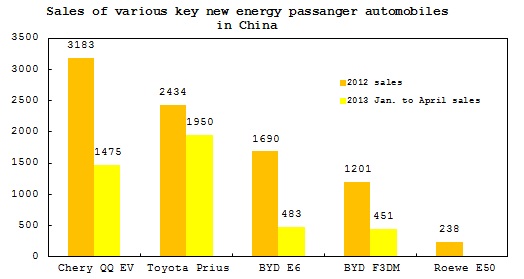Summary: New energy vehicle sales in China in 2012
The development state of new energy vehicles has been a major topic of controversy in China. The government has introduced a series of policies with the aim of encouraging more purchases of these vehicles. In July 2012, the government announced production and sales targets for pure electric and hybrid electric vehicles. However the market has yet to respond positively to these policies, with new energy vehicle sales still remaining relatively low. This in contrast to developed markets, where electric vehicle sales are on the rise. For example, in the US, California-based Tesla posted impressive sales and fiscal performance results for the first half of the year.
The Chinese automobile market is still heavily dominated by traditional gas-powered vehicles. As the country's economy continues to develop, so does the number of automobiles on its roads. In response, fuel consumption is reaching new highs, with Chinese dependence on foreign oil continuing to grow. Statistics show that in early 2009, over 50 percent of Chinese oil came from overseas, a dangerously high level for any one country to maintain economic security at. That rate has increased to 56.4 percent in 2012.
New energy vehicles have not severely helped change this problem, as their overall sales volume remain relatively low. According to statistics from the China Association of Automobile Manufacturers, production and sales volumes for new energy vehicles in China for last year totaled just 12,552 units and 12,791 units, respectively. Those figures are still nowhere close to the 50,000 unit targets the government has set for 2015.
Pure electric vehicles remain the key new energy vehicle type sold in the country, with their production and sales volumes for last year totaling 11,241 units and 11,375 units, respectively. These figures represent respective year-on-year growth rates of 98.8 percent and 103.9 percent, respectively. Meanwhile, 2,713 and 2,580 hybrid vehicles were manufactured and sold during that year.

Chery's QQ EV remains the country's best-selling new energy vehicle in 2012, followed by the Toyota Prius, BYD F3DM, BYD E6 and SAIC Roewe E50. Yearly sales of the QQ EV totaled 3,138 units, followed by 2,434 units for the Prius, 1,690 units for the E6 and 1,201 units for the F3DM.
As for combined results for the first four months of this year, the Prius led the sales charts with 1,950 units, followed by 1,475 units for the QQ EV.
Related Article
- New energy vehicles sales in China from January to June just over 3500 units
- Analysis: Ongoing development of the new energy vehicle industry in China
- China to do more to foster development of new energy vehicle industry
- China Passenger Vehicle Sales Up 9.3% in June
- Chinese government to encourage innovations in new energy vehicle industry with grants
- Tireworld Insight: Domestic tire makers eye overseas expansion
- Tireworld Insight: Price disparity severe between China's rubber exports and imports
- Tireworld Insight: China tire exports dependent on US market performance
- Tireworld Insight: SHFE rubber expected to move in tight range in short-term
- Tireworld Insight: Rubber futures to test near-term resistance at 15,000 yuan/tonne
- Tireworld Insight: China’s tire industry on track of rapid growth






